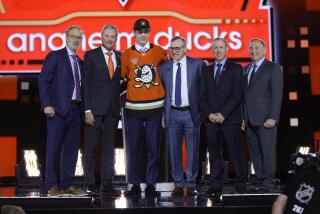McNab Goes Extra Mile for Good of the Ducks
A snowstorm had paralyzed upstate New York, but David McNab was determined to keep an appointment to meet a small but skillful college player who had slipped through the NHL draft.
Cold as it was outside, it was frigid inside Colgate University’s 1,500-seat rink. McNab, the Mighty Ducks assistant general manager and a college hockey goaltender at Wisconsin in the 1970s, huddled in his coat in the morning chill, waiting to take the kid to lunch.
“I remember him sitting and watching practice,” said Andy McDonald, then the object of McNab’s interest and now the center on the Ducks’ top line. “It was encouraging, because a lot of times that kind of attention is more distant, like maybe a telephone call.
“David really went out of his way to meet with me. I knew he came to Hamilton, New York, a lot, which is in the middle of nowhere, and that was a big factor in why I signed with Anaheim.”
McNab, 49, a member of the Ducks’ front office since the team’s inception, is willing to go the distance to check out players at colleges both obscure and famous, kids who weren’t drafted because they had late growth spurts or were deemed too small or otherwise fell through the cracks.
After 10 years of catching red-eye flights out of LAX every Thursday during college hockey season to attend games in the East and Midwest, McNab has 4 1/2 million frequent flyer miles on Northwest, great contacts in the college hockey community, and a finely honed eye for talent. The miles are his, but his knowledge and keen eye are tremendous assets for the Ducks.
In addition to McDonald, who signed as a free agent in 2000, McNab discovered left wing Chris Kunitz at Ferris State in Big Rapids, Mich., and was tipped off by a friend about Dustin Penner, the 6-foot-4, 245-pound winger who has a rare blend of finesse and physical presence.
McDonald was the Ducks’ second-leading scorer this season, Kunitz scored 19 goals, and Penner emerged as an impact player during the second-round playoff sweep of the Colorado Avalanche, which launched the Ducks into the Western Conference finals.
McNab calls scouting “a side thing” that’s secondary to his other duties, which include negotiating contracts and knowing the collective bargaining agreement inside out. But his passion is scouring colleges for gems that might be polished into NHL players.
“I’ve got the best job,” said McNab, who grew up in San Diego while his father, Max, was general manager of the San Diego Gulls of the Western Hockey League.
“I’ve been really fortunate with general managers here, first Pierre [Gauthier] and Bryan Murray and now Brian Burke have allowed me to do this,” McNab said. “There’s some pretty good players out there, and you just have to try to identify the good ones and try to make sure you get them.”
It’s not that simple.
McNab must determine if there’s a valid reason why a player wasn’t drafted, or if that player merely needs someone to believe in him. At 5-11 and 186 pounds, McDonald was judged too small to be effective in the NHL, but McNab urged the Ducks to grab him over Steven Reinprecht, that year’s prize free agent. Reinprecht signed with the Kings but has since moved on three times and is a marginal player; McDonald, speedy and smart and skilled, has thrived.
“We liked Andy better even though he’s smaller,” McNab said. “There’s something about his game.”
Kunitz, signed by the Ducks in 2003 when he was 23, solidified his frame during his four years at Ferris State. His tenacity and two-way game have kept him on the first line with McDonald and veteran Teemu Selanne, and he has contributed two goals and six points to the Ducks’ postseason success.
Penner, 23, had been cut at the junior and Tier 2 levels before he went to tiny Minot State-Bottineau in Bottineau, N.D., whose team was high school caliber. From there he was recruited to play for the University of Maine on a partial scholarship.
McNab visited Maine early in the 2003-04 season “actually to watch somebody else,” but heard about Penner from Grant Stanbrook, an assistant coach at the school who had recruited McNab more than three decades ago.
“Dustin comes on the ice, and here’s this monstrous guy,” McNab said, “and most college free agents are smaller, or there’s some flaw to their game. There just weren’t many guys like Dustin. He was really impressive. And I just followed him that year and saw him a lot. His development was just astronomical. It really wasn’t that difficult to like him. And Maine went to [the NCAA] final game and he was their first-line center and scored the winner in the semifinals....
“This is a guy who for three years played almost nowhere. I’ve explained to people that it would be like a guy getting cut from a high school team in 10th or 11th grade and making the NFL, which is a little hard to comprehend.
“The last 10 or 12 games of their season he really took off. And you just knew. I remember telling Bryan Murray that if you don’t get him now there’s a good chance we don’t get him and we just pushed and pushed.”
McNab was relentless, waiting until after a coaches’ convention in Bangor, Maine, to get Penner to himself and make an offer.
“He had been told his whole life that he couldn’t do it,” McNab said, “and he was intrigued by the fact there was an NHL team that was saying yes, you can do it.”
Penner’s choices came down to the New Jersey Devils and the Ducks. Because of McNab, Penner chose the Ducks.
“He showed the most interest, and he saw me as I see myself, being a player in this league, so that was a good situation for me,” Penner said.
McNab has several other free-agent finds in the pipeline. Most notable are Texas-born goalie David McKee, who broke Ken Dryden’s shutout record at Cornell University and is practicing with the Ducks during the playoffs, and center Ryan Shannon, who was signed out of Boston College and led the Ducks’ Portland farm team in scoring with 27 goals and 86 points in 71 games.
McNab’s desire to see how kids such as Penner, McKee and Shannon turn out keeps him in Anaheim. He has had nibbles for general manager jobs and there was “a time when I had aspirations,” but his wife and two daughters love the area, his 82-year-old father and 81-year-old mother are nearby, in Las Vegas, and he has invested too much of himself in the Ducks to seriously consider leaving.
“General managers that have come in have kept me, and I feel it’s extremely important to be loyal back,” McNab said. “I would rather be here if this team has some success because I identify myself with this franchise.
“Ten million people would love this job.”
But none would do it as well.
More to Read
Go beyond the scoreboard
Get the latest on L.A.'s teams in the daily Sports Report newsletter.
You may occasionally receive promotional content from the Los Angeles Times.







